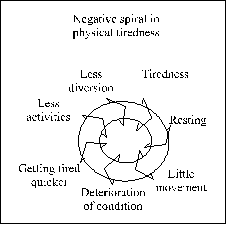|
DEALING WITH FATIGUE CAUSED BY MYOTONIC DYSTROPHY
This is based on a lecture delivered at the yearly meeting organized in October 2000, in the Netherlands, by the “Werkgroep Myotone Dystrofie” for patients and other people involved in myotonic dystrophy. Dr. Karlein Schreurs, Health Psychology, University of Utrecht, prepared this lecture. Email to the coordinator of this group: cees.duijndam@wanadoo.nl
Introduction
The work group asked me to prepare a lecture about dealing with fatigue. So I expect that fatigue is a problem for the majority of my audience. The Muscular Disease Association of The Netherlands (VSN) also publishes this. Out of 900 articles on MD (Myotonic Dystrophy) published during the last three years in the international press, eleven were dealing with fatigue. It is obviously a serious problem for many patients but up till now few research-workers pay attention to it. From where is this discrepancy?
Apparently many patients with MD consider fatigue as a symptom that is part of the disease and cannot be cured. I do hope that I can convince you that this is not always true. It is indeed possible to take measures.
A second explanation for this lack of attention for fatigue with MD is the fact that it is difficult to define fatigue.
What is fatigue?
The question seems superfluous. Everybody knows how fatigue feels. However, often we do not mean the same thing. Normally we think of fatigue when a person has worked hard and consequently is physically exhausted. This fatigue is the lack of energy that someone experiences after performing physical exertion. But also people who have been behind their desks for a whole day may complain of tiredness in the evening. At the end of the day they often think it difficult to concentrate and they forget things easier. These too are manifestations of fatigue after mental stress. A person who is bored feels also tired. After a serious flue you may be unpleasantly caught when daily tasks require more effort than usual. Here fatigue is caused by deterioration of one’s physical condition. We can also think of periods when we feel down and sad. We are not in the mood to undertake things because we feel tired. Here fatigue is caused by one’s emotional mood. Finally it appears that fatigue varies from not feeling fit to total exhaustion. In conclusion, we seem to generalize when we speak of fatigue. Fatigue however is a collective noun for an extensive range of varieties.
Countermeasures that fight with success a certain type of fatigue may fail if they are used to fight another type. Here we should make difference between short acute fatigue and long-term chronic fatigue. The differentiation is not only based on the duration of the fatigue. Opposed to short acute fatigue long-term fatigue is often not related to the degree of exertion. A person feels physically tired or finds it difficult to concentrate irrespective of the amount of effort; taking a rest mostly does not cure this type of fatigue. A frequently used questionnaire for fatigue differentiates between physical and mental fatigue and the consequences of fatigue: A slowing down of activities, but also a decrease in willingness to be active (reduced motivation). (Smets e.a. 1995).
Causes
What causes fatigue in people with MD? This is an unclear area; often more causes can be identified. Muscle-weakness is a symptom of the disease; the disease causing slowness, apathy and lack of initiative may also affect the brains.read more
The physical vicious circle
The normal reaction to physical fatigue is rest. Rest does not help when fatigue has a chronic nature. As rest is the accepted remedy for tiredness, most people will rest even more than usual, also influenced by their environment. They hardly have any physical activity. This inactivity deteriorates their physical condition. In this situation any form of activity tires more quickly. The result leads to diminished activity and means therefore less diversion; this now causes the patient to feel more tired. This circle may be broken up by an adapted daily routine. Attention: This routine does not mean to stop completely taking a rest. We are talking of alternation of activities and rest, adapted to the physical abilities. The muscle weakness and loss of power with MD may complicate it even more. Some muscles are weak and it was found that muscle-reinforcing exercises almost not effect the affected muscles (Lindeman, Spaans, Reulen, Leffers, Drukker, 1999). But it came out that exercises do not harm. It is important to exercise the not-affected muscles to optimise their condition without entertaining unreal expectations.

The psychological vicious circle
The second vicious circle relates to psychological factors, which either maintain or intensify fatigue. If someone feels tired very often he or she may find out that resting hardly helps and therefore it seems that fatigue can hardly be managed. This leads to low spirits and helplessness. This depression makes people less inclined to be active and this will result in less activity and less diversion causing a person to feel totally overpowered by fatigue. In this case looking for control over the situation can break a circle.
It is well known that controlling their situation helps people to feel well. Often people feel less depressed and it helps to organise the day-to-day routine. As soon as people pursue a more active lifestyle, social contacts and activities will increase resulting in reduced focus on fatigue.
Remedies
You may wonder how to control the situation. There are no instant solutions but there are a few approaches. A first way to get some control is to identify the effects of fatigue, is there a medical solution? read more
Conceptions
Research among people with a chronic fatigue syndrome shows that fatigue is intensified and maintained by high standards and strong principles. Demanding people who are perfectionists run the risk of trying to pursue the impossible, which will exhaust them. This regards principles like: “Everything I do should be perfect, or “Whatever I start I’ll finish it” or “I never reject my duty”. Such principles may seem commendable, but if your energy is limited there will be nothing left after fulfilling the duty. There is nothing wrong when splitting up a job in several pieces. We are often not aware that our behaviour is controlled by this attitude. If you feel unhappy and you find out that you are feeling chased, it is worth while to try to find the cause of those feelings. You may ask yourself questions on the consequences of your conceptions and on your willingness to pay the price for such behaviour
Social aspects
Your partner is also facing the consequences of your disease. The partner wishes to support but is also troubled by fear, concern and helplessness.
When you leave your house by yourself for the first time after a long period of time, your partner may get very anxious about it. Also your partner may think to help you by doing every little job for you. This will make you less active than actually necessary. Discuss such matters with your partner.Finally it is well known that people with a chronic disease tend to withdraw from social life. Fatigue reinforces this tendency. This will deprive you of possible diversion, which again does not help to overcome fatigue and other symptoms. You will also miss possible support, which other people might give you. It is true that people may sometimes react improperly to your fatigue. If you show that you are tired often people will say: “All of us get tired from time to time.” Then the choice is yours: You withdraw from social life because nobody seems to understand you or you explain people that your form of fatigue is different from the usual short fatigue.
With this choice we come back to the beginning of my thesis: “Fatigue may be a symptom of Myotonic Dystrophy but this does not mean that nothing can be done”.Everybody can manage fatigue and its consequences better than you might think, hut this does not occur automatically.
FATIGUE DIARY |


